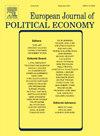重大经济衰退的疤痕效应:财政政策和政府投资的作用
IF 2.3
3区 经济学
Q2 ECONOMICS
引用次数: 0
摘要
对 Covid-19 大流行病的反应长期以来一直被认为是缓慢和不合时宜的,这促使人们重新评估作为稳定工具的财政政策。与此同时,有大量证据表明,尽管采取了积极的财政政策干预措施,重大经济衰退仍会对实际国内生产总值产生持久影响。本文重新审视了自 1970 年以来 26 个经合组织国家(包括 14 个欧盟成员国)的经济伤痕,并研究了财政政策所发挥的作用。我们发现,较高的经常性支出--最受欢迎的积极应对措施--并不能减轻重大经济衰退对实际 GDP 的持久影响。相比之下,增加政府投资会有所帮助,但通常很少受到关注。因此,疤痕效应非常明显,使政府面临可持续发展的风险,这反过来又削弱了政府在随后的经济衰退中的回旋余地。总之,财政政策制定者在发生重大经济衰退时面临两个难题:(i) 采取正确的财政扩张方式,(ii) 找到从短期稳定转向财政整顿的正确时机,同时保护投资。这两个难题都充满了政治经济问题。本文章由计算机程序翻译,如有差异,请以英文原文为准。
Scarring effects of major economic downturns: The role of fiscal policy and government investment
Long shunned as slow and ill timed, the response to the Covid-19 pandemic initiated a reassessment of fiscal policy as stabilisation tool. At the same time, there is ample evidence that major economic downturns produce lasting effects on real GDP in spite of active fiscal policy interventions. This paper takes a fresh look at economic scarring in 26 OECD countries, including 14 EU member states, since 1970 and examines the role played by fiscal policy. We find that higher current expenditure – the favoured active response - does not mitigate the lasting impact of major economic downturns on real GDP. In contrast, more government investment can help but generally receives little attention. As a result, scarring effects are significant confronting governments with sustainability risks, which in turn weigh on the room for manoeuvre in subsequent downturns. In sum, fiscal policy makers face two difficulties in the event of a major economic downturn: (i) adopt the right type of fiscal expansion, and (ii) find the right time to pivot from short-term stabilisation to fiscal consolidation while protecting investment. Both challenges are fraught with political economy issues.
求助全文
通过发布文献求助,成功后即可免费获取论文全文。
去求助
来源期刊

European Journal of Political Economy
Multiple-
CiteScore
3.40
自引率
10.00%
发文量
106
期刊介绍:
The aim of the European Journal of Political Economy is to disseminate original theoretical and empirical research on economic phenomena within a scope that encompasses collective decision making, political behavior, and the role of institutions. Contributions are invited from the international community of researchers. Manuscripts must be published in English. Starting 2008, the European Journal of Political Economy is indexed in the Social Sciences Citation Index published by Thomson Scientific (formerly ISI).
 求助内容:
求助内容: 应助结果提醒方式:
应助结果提醒方式:


